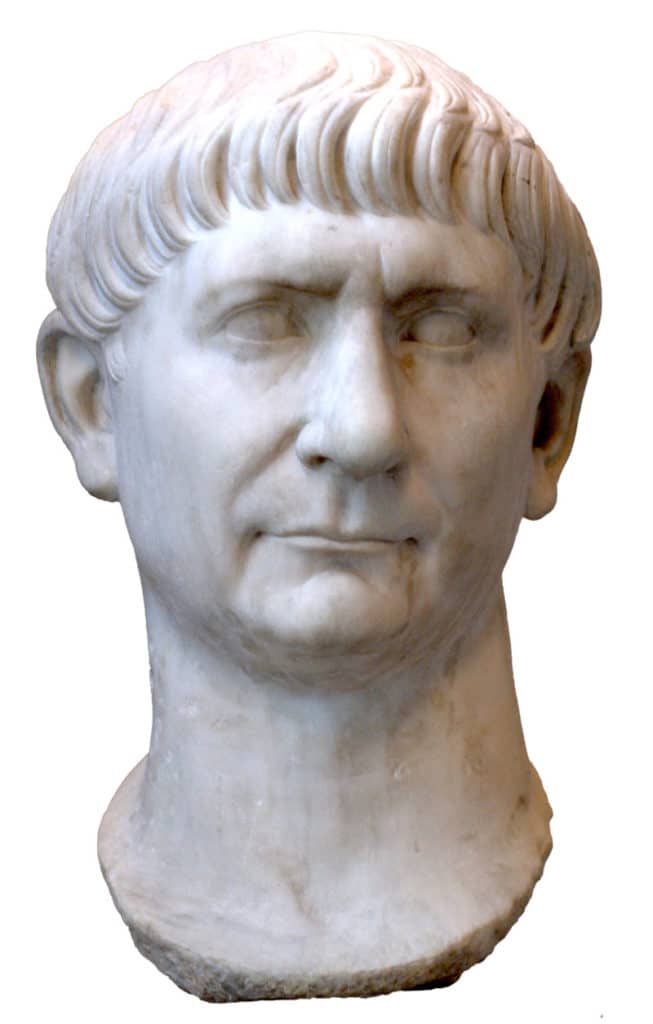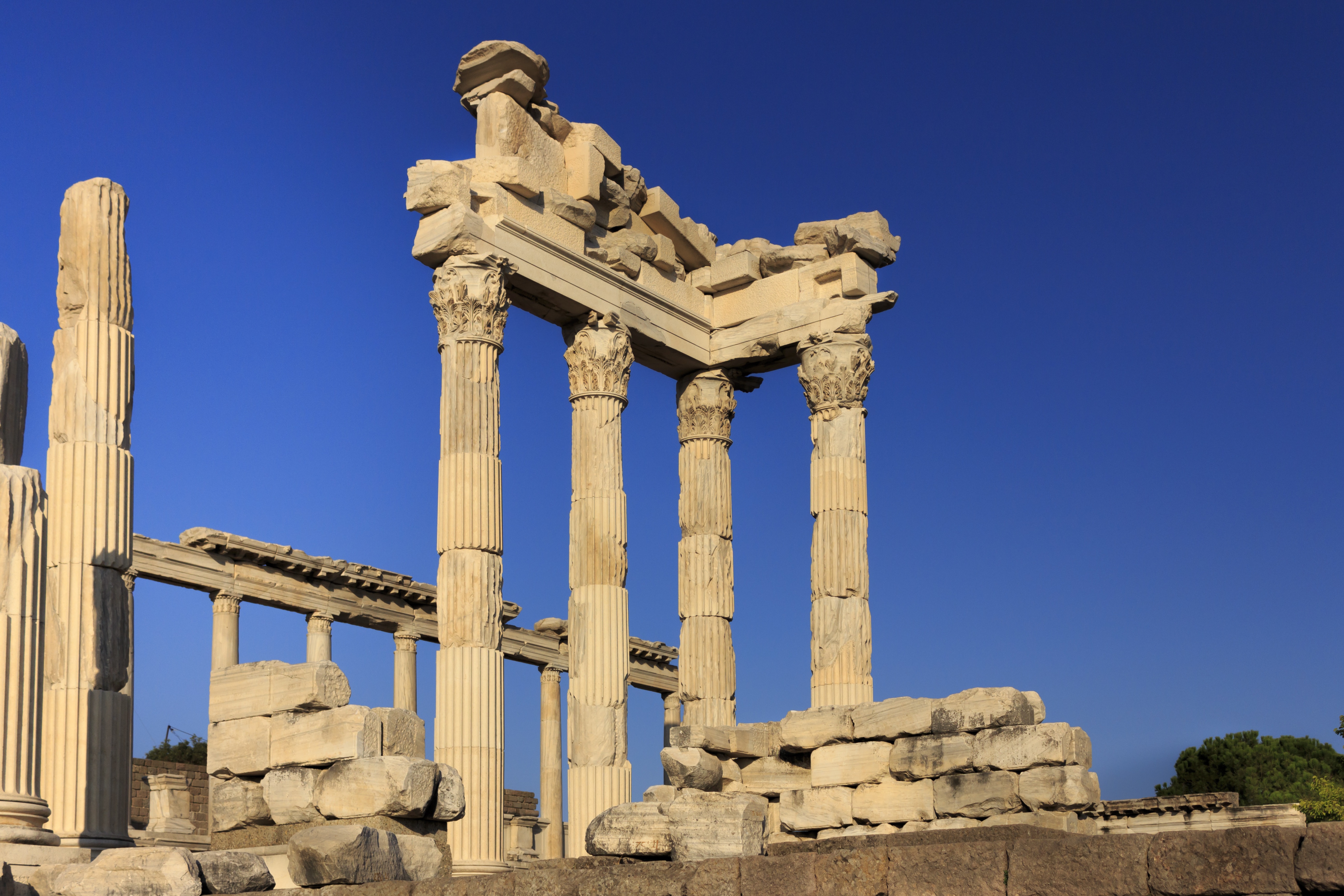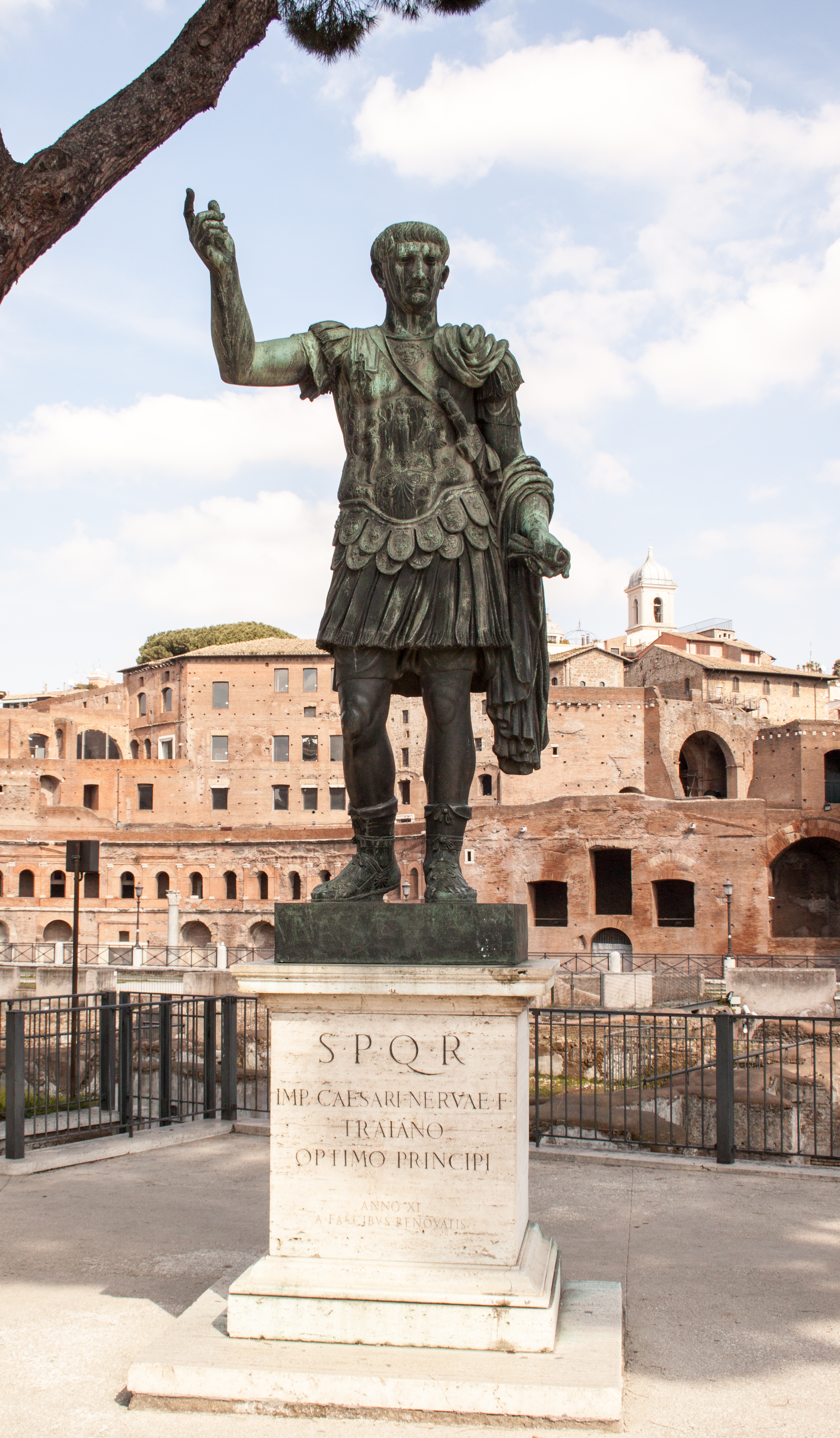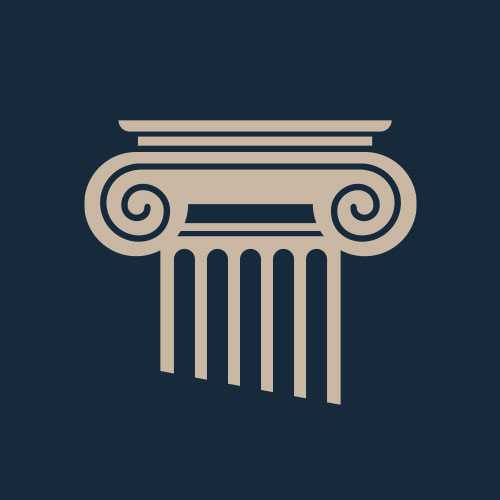Life: AD 52 – 117

- Name: Marcus Ulpius Trajanus
- Born on 18 September AD 53 at Italica in Spain.
- Consul AD 91, 98, 100, 101, 103, 112.
- Became emperor on 28 January AD 98.
- Wife: Pompeia Plotina.
- Died at Selinus, 7 August AD 117.
Marcus Ulpius Trajanus was born on 18 September in Italica near Seville, most likely in the year AD 52. His Spanish origin made him the first emperor not to come from Italy. Although he was from an old Umbrian family from Tuder in northern Italy that had chosen to settle in Spain. So his family was not a purely provincial one.
His father, also called Marcus Ulpius Trajanus, was the first of the to reach the office of senator, commanded the Tenth Legion ‘Fretensis’ in the Jewish War of AD 67-68, and became consul in around AD 70. In about AD 75, he became governor of Syria, one of the key military provinces in the empire. Later he was to be governor of the provinces of Baetica and Asia.
Trajan’s Military Career
He served in Syria as a military tribune during the governorship of his father. He enjoyed a thriving career, gaining the office of praetorship in AD 85. Soon after he won command of the Seventh Legion ‘Gemina’ based at Legio (Leon) in northern Spain. It was in AD 88/89 that he marched this legion into Upper Germany to help suppress the rebellion of Saturninus against Domitian. His army arrived too late to play any part in crushing the revolt, but his swift actions on the emperor’s behalf won him the goodwill of Domitian and so he was elected as consul in AD 91. Such close ties to Domitian naturally became a source of some embarrassment after the loathed Domitian’s murder.
Domitian’s successor Nerva though was not a man to hold a grudge and in AD 96 Trajan was made governor of Upper Germany. Then, late in the year AD 97 Trajan received a handwritten note from Nerva, informing him of his adoption. If Trajan had any form of advance knowledge of his impending adoption is not known. His supporters in Rome may well been lobbying on his behalf and the adoption was naturally pure politics. Nerva required a powerful and popular heir in order to prop up his severely shaken imperial authority. Trajan was highly respected within the army and his adoption was the best possible remedy against the resentment much of the army felt against Nerva.
But the heir to the throne didn’t come speeding back to Rome in order to help restore Nerva’s authority. Rather than going to Rome, he summoned the leaders of the earlier mutiny by the praetorians to Upper Germany. But instead of receiving a promised promotion, they were executed on arrival. Such ruthless actions made it quite clear that with Trajan as part of it, Rome’s government was not to be messed with.
Rise to the Throne
Nerva died on 28 January AD 98. But the new Emperor once more felt no need for hasty, potentially undignified, action. For he went on a tour of inspection to see the legions along the Rhine and Danube frontiers. With Domitian’s memory still held dear by the legions it was a wise move by Trajan to bolster his support among the soldiers with a personal visit to their frontier strongholds. His eventual entry at Rome in AD 99 was a triumph. Jubilant crowds rejoiced at his arrival.
The new emperor entered the city on foot, he embraced each of the senators and even walked among the ordinary people. This was unlike any other Roman emperor and perhaps grants us a glimpse of Trajan’s true greatness. Such modesty and openness easily helped the new emperor gain yet more support during the first years of his reign.
Such humility and respect for the senate as well as for the simple people showed when Trajan promised that he would always keep the senate informed about the affairs of government and when he declared that the emperor’s right to rule was to be compatible with the freedom of the people who were ruled.

Emperor Trajan
Trajan was an educated but not an especially learned man, who no doubt was a powerful, very masculine figure. He loved hunting, ranging through forests and even climbing mountains. Further, he possessed a true sense of dignity and humility which in the eyes of the Romans made him an emperor of true virtue.
Throughout Trajan’s reign, there was an ever-increasing program of public works. The road network in Italy was renovated, sections that passed through wetlands were paved or placed on embankments and many bridges were built. Also, provisions for the poor were made, especially for children. Special imperial funds (alimenta) were created for their upkeep. (This system would still be in use 200 years later!) But with all his virtues, Emperor Trajan was not perfect. He tended to overindulge in wine and had a liking for young boys. More still he seemed to truly enjoy war.
Military Campaigns
Much of his passion for war came from the simple fact that he was very good at it. He was a brilliant general, as shown by his military achievements. Quite naturally he was very popular with the troops, especially due to his willingness to share in the hardships of his soldiers. Trajan’s most famous campaign is undoubtedly against Dacia, a powerful kingdom north of the Danube in modern Romania.
Two wars were fought against it, resulting in its destruction and annexation as a Roman province in AD 106. The story of the Dacian Wars is illustrated in the impressive relief carvings which spiral upwards around ‘Trajan’s Column’, a monumental pillar standing Trajan’s Forum in Rome. Much of the great treasure conquered in Dacia was used to build public works, including a new harbor at Ostia, and Trajan’s Forum.
But his passion for military life and warfare would grant him no rest. In AD 114 he was at war again. And he should spend the rest of his life campaigning in the east against the Parthian empire. He annexed Armenia and spectacularly conquered the whole of Mesopotamia, including the Parthian capital Ctesiphon. But Trajan’s star then began to fade. Revolts among the Jews in the Middle East and the recently conquered Mesopotamians weakened his position to continue the war and military setbacks tarnished his air of invincibility. Trajan withdrew his troops to Syria and set out back to Rome. But he should not see his capital again.

Death
Already suffering from circulatory problems, which Trajan suspected were due to poison, he suffered a stroke which partially paralyzed him. The end came shortly after when he died in Selinus in Cilicia on 9 August AD 117. His body was taken to Seleucia where it was cremated. His ashes were then carried back to Rome and were placed in a golden urn at the base of ‘Trajan’s Colum’.
His fame as the near-perfect Roman ruler was remembered for time to come. His example was what later emperors at least aspired to live up to. During the fourth century, the senate still prayed for any new emperor to be ‘More fortunate than Augustus and better than Trajan’ (‘Felicior Augusto, melior Traiano’).

People Also Ask:
What are some interesting facts about Trajan?
Born in Italica (Seville in modern-day Spain), Trajan was the first Roman emperor born outside of Italy. He was also one of the first emperors to be chosen, rather than to inherit power as part of a ruling family.
What is Trajan best known for?
As emperor, Trajan expanded the Roman Empire to become larger than ever before. He conquered Dacia (now part of Romania), which provided land for Roman settlers and rich pickings from gold and salt mines. He then attacked the Parthians, Rome’s old enemy in the East, who lived in what is now part of Iran.
What did people think of Trajan?
The ancient Romans were so fond of him that they officially bestowed upon him the epithetical title optimus princeps or “the best first citizen.” It is safe to say that the Romans felt Trajan was well worth celebrating—and celebrate him they did.
How old was Trajan when he died?
He was 63 years old.
Was Trajan a good or bad Emperor?
He was considered one of the best emperors by the Roman Senate. After his death, they would honor new emperors with the saying “be luckier than Augustus and better than Trajan.” He was the thirteenth Roman Emperor and the second of the Five Good Emperors.
What is a quote from Trajan?
“Were I still young, I would’ve crossed to India also,” Latin historian Dion Cassius, quotes Emperor.
Who were the five good emperors?
Five Good Emperors, the ancient Roman imperial succession of Nerva (reigned 96–98 CE), Trajan (98–117), Hadrian (117–138), Antoninus Pius (138–161), and Marcus Aurelius (161–180), who presided over the most majestic days of the Roman Empire. It was not a bloodline.

Historian Franco Cavazzi dedicated hundreds of hours of his life to creating this website, roman-empire.net as a trove of educational material on this fascinating period of history. His work has been cited in a number of textbooks on the Roman Empire and mentioned on numerous publications such as the New York Times, PBS, The Guardian, and many more.
